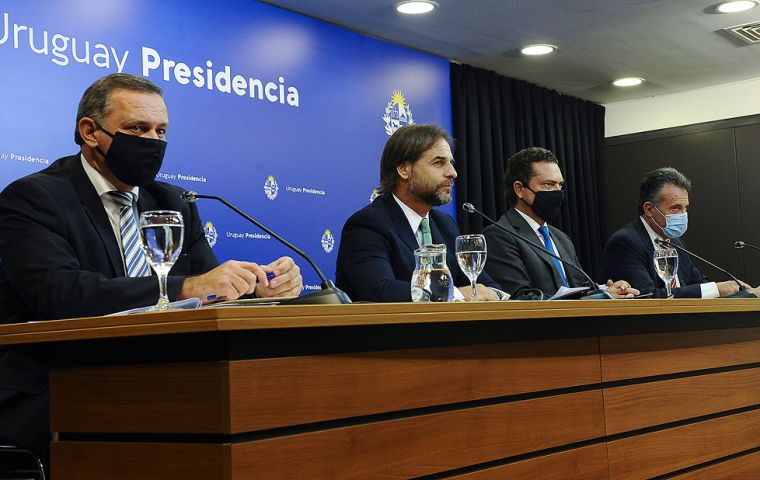MercoPress. South Atlantic News Agency
Uruguay will receive first batches of Pfizer and Sinovac vaccines late February or early March: US$ 120 million investment
 President Lacalle Pou and several of his ministers during the press conference
President Lacalle Pou and several of his ministers during the press conference Uruguayan president Luis Lacalle Pou announced on Saturday that his government will be purchasing “vaccines for 2,8 million people”, and the first doses are expected in the country in March, with an overall investment of some 120 million dollars.
On Friday evening Lacalle Pou tweeted his government had reached an accord with the US/German Pfizer-BioNtech and China's Sinovac for the purchase of two million and 1,7 million vaccines against the Covid 19 virus.
The Uruguayan president on Saturday said the deal with Pfizer-BioNTech involved two million doses and the first 200,000 should be arriving in March, although he did not discard the possibility that the delivery could be brought forward to the end of February.
Likewise with Sinovac the deal involves 1,750.000 doses with a first batch of 200,000 to begin with the inoculation plan with a similar date to that of the US/German vaccine.
“Once the payment has been done there is a deadline for delivery”, but the president did not give more specifications. He also referred to comments about the effectiveness of the Chinese vaccine, from the coordinator of Uruguay's scientific advisory group. Rafael Radi, who said the purchase was “a very good combination of vaccines”
“We did not purchase any vaccine which has not been approved. The two have different conditions, China's Sinovac is similar to the kind of vaccines the country is used to, and most probably will experience the less collateral effects or negative impacts. Pfizer on the other hand has had a greater exposure, but all vaccines are good and have been approved and recommended, otherwise we would not have advanced with negotiations in the name of Uruguay”
Lacalle Pou also revealed that in both documents there are clauses which refer to the speed with which he labs can manufacture and deliver the product, which normally is five years. But given the pandemic all countries have urged for a quick delivery, and Uruguay also has certain responsibilities it must abide..
Besides these two deals Uruguay has been guaranteed participation in the Covax scheme sponsored by the UN and WHO. This batch includes 1,5 million doses which will allow the immunization of 750,000 people, “so this means that in early March we will have sufficient doses for 3% of the Uruguayan population”. According to the latest census, the country's population stands at 3,650.000.
Lacalle Pou also announced that negotiations are continuing with three other labs including Johnson & Johnson, but “we still have to access the efficiency results”.
“The target of the government is to have sufficient doses to vaccinate at least 2,8 million people”, underlined the president who also took the opportunity to underline that vaccination is not mandatory. He made it a point to thank the cabinet chief and ministers, as well as several lawyers and the head of the scientific advisory group.
“It's really a privilege to work with so many Uruguayans committed with the country, and who are giving us such a big hand”.
As to the vaccination program, “which is based on scientific advise” it will begin with the health staff and workers, hosts at old age homes, followed by those 75 and above and those linked to the education system, since “we want to ensure the school year can begin with children attending classrooms”.
Lacalle admitted that a previous plan for the vaccination of 600,000 Uruguayans per month, “was out of the mark, a bit too ambitious”, but this is the beginning of the process“, and insisted on what he described as the ”leading vaccine“..
”Face masks and social distancing continue as the main vaccine. We must not think that because inoculation is about to begin, we can forget about the sanitary precautions. I would add that the scientific advisory group has recommended we drastically lower the number of contagions so that the immunization process can be far more effective“.
In a reply to a question, Lacalle Pou also mentioned that the priority vaccination, much of which will depend on the arrival of the doses and logistics, will include members of security and armed forces, firefighters and the imprisoned population.
Public Health minister Daniel Salinas, attending the press conference, gave details of the logistics to be implemented when inoculation begins and showed slides or freezer equipment to deal with the Pfizer vaccines that needs to be kept at minus 70 Celsius.
”We have these ultra freezers installed and working at dependencies of the Health ministry“, said Salinas. ”Keeping these extreme low temperatures is the main challenge of the Pfizer vaccine, but we are ready“.
Pfizer/BioNTech vaccines will be arriving from Belgium to Carrasco airport, and ”we have the necessary transport to ensure the deep freeze temperatures when they are taken to the Health ministry”, added minister Salinas.




Top Comments
Disclaimer & comment rulesCommenting for this story is now closed.
If you have a Facebook account, become a fan and comment on our Facebook Page!